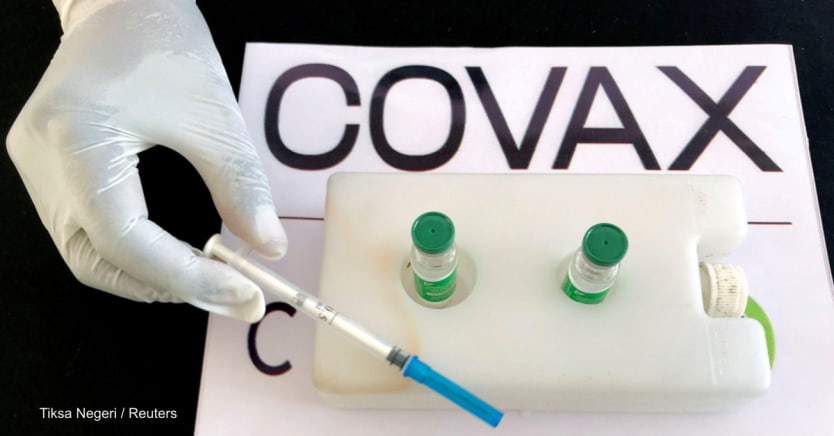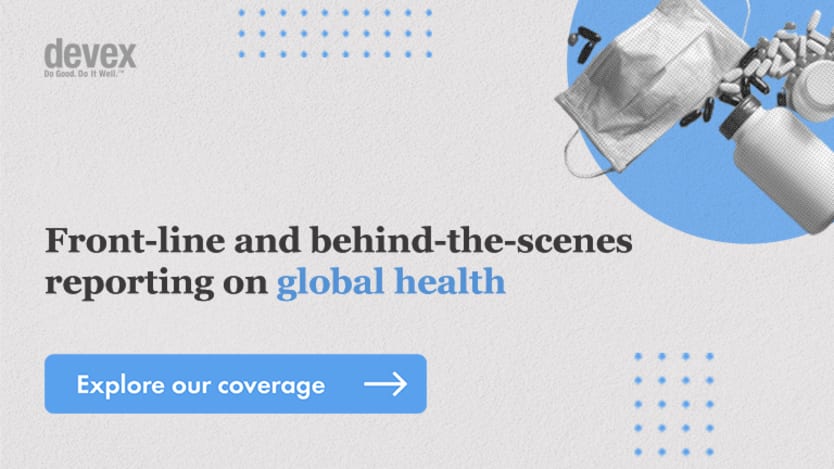
Vaccine inequity is one of the most striking — but solvable — challenges of the COVID-19 pandemic. It also provides a wake-up call for what can happen when so-called least-developed countries, or LDCs, are not able to participate fully in global trading systems.
Sign up for Devex CheckUp
The must-read weekly newsletter for exclusive global health news and insider insights.
By supporting programs such as COVAX, advancing trade facilitation efforts, and directing more aid toward trade initiatives such as Aid for Trade, the global community can help right this imbalance.
As of Monday, only 1.1 % of people in low-income countries had received at least one COVID-19 vaccine dose. This is making it harder to battle a third wave of infections, as the highly transmissible delta variant spreads across many nations.
In the World Health Organization’s Africa region — where a high number of LDCs are located — COVID-19 fatalities surged 44.2% over one week in July. The coronavirus is devastating many LDCs’ already fragile economies and causing poverty and inequality to rise. Without equitable access to vaccines, global economic recovery cannot be sustained and progress toward the Sustainable Development Goals will be derailed.
While trade alone cannot eradicate vaccine unequity or its negative consequences for the economy and vulnerable groups, it has a powerful contribution to make. Here are four actions that would make an impact:
1. Increase COVAX support
Vaccine equity can only be achieved if the global community eschews vaccine nationalism. High-resource countries should ramp up donations through the vaccine-sharing initiative COVAX and commit to securing a swift, workable resolution to ongoing debates around technology transfers and intellectual property waivers.
While countries in the G-7 group of nations have pledged to increase their support for COVAX, the initiative has faced hurdles in the form of supply bottlenecks, export restrictions, and logistical weaknesses. Many currently available COVID-19 vaccines have short shelf lives and must be stored at low temperatures. LDCs can only benefit from donated doses if they have fast and efficient processing at their borders, modern transportation systems, and access to cold chain infrastructure.
While trade alone cannot eradicate vaccine unequity or its negative consequences ... it has a powerful contribution to make.
—2. Prioritize trade facilitation
Accelerating implementation of the World Trade Organization’s 2017 Trade Facilitation Agreement is critical for helping LDCs overcome these challenges. A total of 154 WTO members now support the agreement, which pledges investment in the simplification and modernization of the movement, release, and customs clearance of goods globally. It also aims to help low-income countries overcome these same barriers through technical assistance and capacity building.
The Global Alliance for Trade Facilitation has made good progress in identifying barriers to vaccine equity and introducing solutions. In Mozambique, for example, the alliance is working to digitalize pre-shipment authorization for vaccine imports — a process that can take as long as two weeks, during which vaccine doses must be kept in storage. This digitalization should help Mozambique decrease wait times, improve shipment traceability, and reduce storage and inventory management costs.
Yet more work remains to help governments overcome challenges associated with implementing the Trade Facilitation Agreement, such as changing domestic legislation and involving the private sector. Lower-income countries and LDCs have flagged a need around human resources and training, legal assistance, and the acquisition of information and communication technologies.
3. Commit to Aid for Trade
For LDCs to participate fairly in global vaccine supply chains — as importers or exporters of inputs and finished products — they need financial and technical assistance to strengthen their productive capacity, streamline their cross-border standards and processes, and improve their logistics infrastructure and technological know-how.
The Aid for Trade initiative exists to provide that support — but can only deliver if donor countries maintain or increase their official development assistance, or ODA. Preliminary figures from the Organisation for Economic Co-operation and Development show that Development Assistance Committee members expanded their ODA by $10 billion between 2019 and 2020, mostly as part of their COVID-19 response.
However, with several government donors having reprogrammed their aid budgets to focus on immediate health priorities, fears are growing that their overall ODA may also be slashed — and, with this, their support for Aid for Trade.
The generosity of some countries provides hope. Norway, for example, recently stepped up to help plug such gaps with 45 million Norwegian kroner of additional funding for the WTO-backed Enhanced Integrated Framework, a global Aid for Trade program that aims to reduce poverty.
4. Invest in preparedness
In 2019, only $374 million — or less than 1% — of the world’s total development assistance for health was spent on pandemic preparedness. Within months, the consequences of that underinvestment became clear.
Integrating lower-income countries and LDCs into global and regional pharmaceutical value chains is vital for ensuring the world is better prepared next time. Directing increased aid to help these countries become producers and exporters of medical equipment and vaccines has never been more needed. LDCs would not only receive more of the vaccines and therapeutics they need now but could actively contribute to the global response when the next pandemic inevitably hits.









